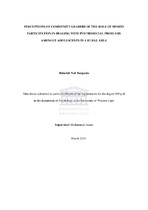| dc.description.abstract | Participation in recreational and formal sports can play a vital role in enhancing adolescents' wellbeing. Research indicates that involvement in different forms of recreation and physical activities offer beneficial effects on the physical and mental health status of individuals. Sports participation has also been associated with lowered obesity, multiple risk behaviours, smoking and substance abuse. In South Africa rural and urban areas are increasingly affected by violence and a range of psychosocial problems such as youth crime, substance abuse and alcohol abuse. The aim of this research project was to explore the perceptions of community leaders of the role of sports participation in dealing with psychosocial problems amongst adolescents in a rural area. A qualitative approach was adopted to explore the perceptions of community leaders. Purposeful sampling was used to select participants according to the criteria set by researcher. The data was collected through the process of 10 indepth, semi-structured interviews with Afrikaans speaking community leaders, male and female from the two rural towns in the Cederberg region namely, Lamberts Bay and Clanwilliam. The semi-structured interview schedule consisted of five open-ended questions. A thematic content analysis was used to interpret the information. The study revealed that community leaders perceived sports participation as a protective factor against psychosocial problems within the community. They discussed sports benefits under three broad themes namely, health benefits, societal benefits and emotional benefits. The study further revealed poor financial resources, transport and poor facilities to be the major constraints for sports participation in their area. Future studies which explore the role of sports participation should include more information from a female's perspective, to enrich and understand the benefits of sports participation amongst females in the community. | en_US |

